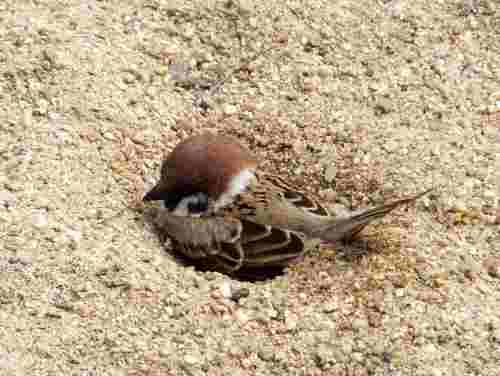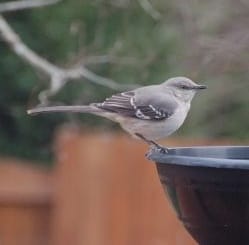
How Many Cleansing Habits Do Wild Birds Practice?
Bird baths providing water are not the only type of bath needed and used by wild birds.
There are a couple of other peculiar types of “bathing” needs that wild birds have, let’s discover them.
Dust Baths
A “dust” bath is an unusual type of “bath”.
The very sound of it is a paradoxical statement as dust is not a term we normally associate with cleansing.
“Dusting” is a very necessary practice for wild birds though.
Unlike bird baths that hold water, they are not well known to bird watchers.
Why Do Birds Use Dust Baths?
It is believed that wild birds participate in dust baths to help them get rid of parasites.
A wild bird dust baths are really dry soil that we term “dust”.
They perform this bathing ritual by “flinging” dry loosely packed dirt over themselves.
When you observe wild birds “dusting” themselves in this fashion, their actions are not unlike watching them in a bird bath.
Testing the “dust” (as if it were water), a little “splashing”, and then full fluttering and carrying on!

You can provide a dust bath, if the birds have not chosen their own location.
Simply choose a bare patch of ground, preferably an area that drains well after a rain.
Rake the area slightly to loosen the top layer of soil, doing this regularly will keep the area fresh and prevent disease.
The dusting area should be close enough to cover like a bush, so the birds will have a safe place to flee in case a predator arrives on the scene.
It may not be possible though to attract them to a specific location for dust bathing.
But if you keep a vigilant watch and notice this practice somewhere in your yard, then providing a little help with raking and cover, may encourage “dusters” (the term used for birds that engage in a dust bath) to partake in this entertaining activity.
It may help us to understand this seemingly peculiar wild bird habit by comparing it to a human practice.
All we have to do to increase our understanding is to add water to the “dust” and talk about a “mud” bath.
Then some light is shed on the matter. There is no way to discover the real benefits of dust baths to birds.
But perhaps, like people who mud bathe to derive a relaxation and cosmetic benefit, our feathered friends too may experience similar gain.
Most wild birds perform dust baths.
Watch a California Condor Mom giving her chick a dust bath. It’s fascinating to watch this beautifully feathered animal be so tender and loving.
Now lets have a look at 2 other interesting ways birds cleanse themselves other than water bathing and dust baths.
Why Do Birds Sun Bathe?
Yes, really! Not for tanning, but for other reasons.
Wild birds can be observed sun bathing at any time of the year. They will find a protected spot, out of the wind and safe from predators.
It is often observed that wild birds while sun bathing, appear to be oblivious to what is going on around them.
It could be conjectured that they are so enjoying this practice that they lose awareness of their surroundings.
Wild birds will bask in the sun on cool mornings to warm themselves up.
Hummingbirds can be observed early in the morning perched on a feeder that is located in the morning sun warming themselves.
Birds will also sit exposed to the sun after a bath to dry off and preen their feathers.
But there are other times when they will perch and spread their wings and tail feathers for what appears to be for the sole purpose of “sun” bathing.
They sometimes position themselves in awkward positions to expose different parts of their body to the rays of
the sun.
They simply just appear to be enjoying the warmth, healing and rejuvenating effects of the suns beams.
It is not hard to understand how good that feels!
How Does the Practice of “Anting” Work?
It is believed wild birds practice anting for a number of reasons, such as another method to help them get rid of parasites.
Ants, as well as other insects secrete a liquid which contains chemicals. One of the chemicals that ants secrete is formic acid and may be of benefit to the birds.
Let me explain.
When a feathered friend feels the need to rid themselves of some pests they will find a dry, safe spot where there are many ants in the area and stand in the midst of the insects and allow them to crawl on their body.
Wild birds have also been observed rolling on top of an ant hill to crush them or picking them up in their bill and then rubbing the insect on their feathers.
It is unclear whether the birds are simply getting rid of the sac that holds the formic acid before eating the insect as the chemical is quite bitter or whether they are purposely applying the chemical on their feathers.
Nevertheless formic acid has properties as a pesticide, anti-fungal and anti-bacterial. These are all medicinal resources that birds could benefit from.
To us this may seem not only an unusual activity but a little on the repulsive side as well.
But there are many symbiotic relationships in nature that seem odd but work to the benefit of both participating members. ?
Some of the information on this page came from eNature.com.
More Info On Types of Bird Bathing Habits Below & In the Right Column
- Dust Baths, sun bathing and “anting” may seem like odd practices to humans, but we actually practice activities for the very same purposes.
- Cleaning Bird Baths on a regular schedule is very necessary for wild bird health and enjoyment.
- Heated Bird Baths are a wonderful way to provide water for wild birds in winter in areas where the temperatures reach the freezing mark.
- #1 Heated Birdbath Review will point out the benefits and the drawbacks of this favourite & versatile heated birdbath.
- Homemade Bird Bath How to make a recycled, upcycled bird bath by repurposing used items. The birds love it and it is beautiful too.
- Bird Bathing Info A bath for birds also provides a basic need for the wild birds too and that is water to drink to sustain their lives.
